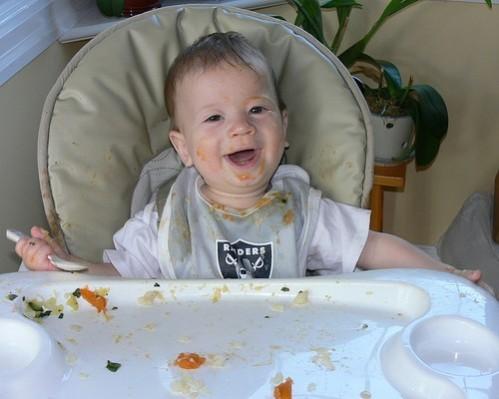
Letting your little ones explore the meal can make them smarter, according to a new study.
Most of the parents never allow their young ones to touch or play with their food. However, Larissa Samuelson and colleagues from the University of Iowa in the US found that messing up with food, while sitting in a highchair helped building a strong vocabulary early in life, facilitating cognitive development and functioning, in the following stages of growth.
The findings are based on the experiments researchers conducted on a group of 16-month-old children. It is a well-known fact that toddlers learn names of solid objects faster than non-solid objects, because they find it easy to remember and identify the former from its constant size and shape. Interestingly, in the new study, researchers found that placing a toddler in a familiar situation, i.e., a highchair; can help them learn even names of the so-called difficult non-solid items.
"It turns out that being in a high chair makes it more likely you'll get messy, because kids know they can get messy there," Samuelson, the senior author on the paper, said in a statement.
Toddlers in the new study were exposed to 14 non-solid objects, mainly food items like pudding, soup, juice and applesauce. Researchers described the items to the toddlers in different made-up words like "dax" or "kiv."
Each child approached the food differently, by poking, throwing or eating. Researchers said that these actions displayed how the child was trying to understand the food items and connect with their names.
Surprisingly, children who played more with the food items identified and named them correctly than the others. "It may look like your child is playing in the high chair, throwing things on the ground, and they may be doing that, but they are getting information out of (those actions)," Samuelson explained. "And, it turns out, they can use that information later. That's what the high chair did. Playing with these foods there actually helped these children in the lab, and they learned the names better."
"It's not about words you know, but words you're going to learn," Samuelson added.
The study has been published in the journal Developmental Science.









